#Serious Authoring (Shitposts)
Explore tagged Tumblr posts
Text
Alert: this is a very stupid post and not to be taken seriously.
So when it was revealed the first attack on Keyleth was Ludinus trying to test drawing out Vax, folks were pointing out that Ludinus would have had to stay up to date on Vox Machina romances in order to have the information to make that plan, which is very funny. I posit an additional hypothetical: if the preliminary attack had accidentally been fatal for Keyleth herself (I say accidentally because Ludinus would want to wait to execute the plan in full later, so wouldn't have killed her then) then Ludinus would have lost his bait and would have to figure out another way to draw out Vax.
And you know what that means. Matchmaking. Get the sad bird man to fall in love again so he can threaten the new person. Ludinus using every iota of his skill in manipulation and patience and influencing of events to set up Situations, and he needs it because as a celestial champion Vax is not just walking around into your average coffee shop. He becomes the king of tropes. He reads trash romance to get ideas and runs into Caleb at a naughty book store in Rexxentrum and it's very awkward for both of them. With centuries of experience and villainy, HOW has it come to this-
#he's picked up a Fiona Fancypants novel & felt deeply unsettled for no reason he could detect and since ignored everything from that author#once again this is a joke post not to be taken seriously#it's just Monday and I'm dodging the horrors#if Ludinus did kill Keyleth in serious Vax would probably go straight to the source in vengeance#also Gilmore - though happily married - is certainly still there and would be a next target perhaps#and Vex as foxqueen pointed out#as I say this is purely to envision Ludinus using all his prowess for something stupid lol#c3#critical role#ludinus da'leth#op#it's shitpost o'clock
112 notes
·
View notes
Text
So I don't usually talk about game canon stuff on this blog because I'm doing My Own Shit.
But I just find it really funny that Monika calls herself a "high school devil" on Twitter like
girl no
Even considering the meta angle of "she's doing all the villainy in the main game" it's just... Like she fails. Monika loses.
I think the devil thing is more about how she's a chronic schemer. But here's the thing: Monika has never canonically had success with any of her complex plots. Or even a simple plot. Everything she's ever attempted to meticulously construct and execute has been either a general failure or severely embarrassing.
32 notes
·
View notes
Text
Fyodor doesn’t celebrate his birthday (too many candles, it makes him feel old) but he does celebrate the anniversary of his last death
#I saw deathiversary fanart and had a thought#anyways#what is his birthday?#I need to take a peek at the real author#see what his birthday is#but yeah#like okay we as a fandom need to accept that Fyodor is silly#he’s not a big oo scary super serious villain#he’s a big oo scary super silly villain#he celebrated the aniversario of his last death#*aniversary#I was using Spanish keyboard on accident#I don’t even speak Spanish#I don’t know why I have Spanish keyboard#anyways fyodor’s birthday cake is a fire hazard#I rest my case#fyodor dostoevsky#bsd shitpost#fyodor dostoyevsky bsd
2 notes
·
View notes
Text
all my serious posts get way more notes than my shitpost i guess im just not funny lol
#author makes a speech#like im happy you guys agree with my honest thoughts!!!! i am!!!!#i just think its kind of funny that i mostly brand myself for shitposting and talking about my story#but on the rare chance i get Serious THATS when i get like 100+ notes lol
15 notes
·
View notes
Note
Which authors you're going to kill next? (My not a very good joke)
Well if I'm being honest, Drew Karpyshyn is always at the top of my 'must kill' list because of how god awful the Revan novel is (while also being irrevocably canon and leading into the events of swtor--destroys myself).
More seriously though, my blog title is just a joke for how often I do like to analyze things without necessarily looking for the true author's intent. I very much subscribe to looking at what arguments the text is making in a vacuum--I think it is just as important to view alone and to view with the historical/authorial context.
I got frustrated a lot in college at the focus on the author, because while I do acknowledge that as a vital aspect of literary critique, it just irritated me that I was so often discouraged from making alternative arguments using the text.
#shitpost#and thats why im happy i finished college lmao#and also why i had to stop reading books for like 5 years post college.#i did so much reading and so much focusing on authors i was burned out of reading itself#sorry lmao i like got too serious here#im just honestly not funny enough a person to carry on a joke.
2 notes
·
View notes
Text
at yet another juncture in my life where i am making a Serious Attempt to become a Published Author, let's see what ruins it this time
#gay and obscure nonsense#last time it was getting sidetracked by getting my vet tech license#so all my writing time got eaten by studying#idk man this has just become the thing i do every time i start to hate my job#but you know what? i think i'm getting a little closer every time#and this time i've rediscovered the ability to Read For Fun#i should PROBABLY think about getting Medicated as that might help a lot but yknow. one thing at a time#also considering whether i should talk about my writing and oc's and stuff on here#on one hand if i got pub'd that would link my Serious Author Identity to my Shitposting on Tumblr identity#on the other hand the freaks on this website are my target audience anyway
0 notes
Text
AAAAAAAAAAACCCCCCKKKKKKKKKKKK, CRRYIINGGGGG, WAIT, WAIT, HOLD ON, WAIT

OH MY GOOODDDDDDDDDDDDD, HE'S SO FREAKING CUTTEEEE, MY SHY LIL BABY BOIIIII, AAAAAAAAAAAAAAAAAAAAAAAAAAAAA-
I'M CRYING, MAN, I'M CRYING. O K A Y. FIRST OFF. I can't stress enough how. Freaking shocked I get when people draw my versions, okay.
AND I SHOULDN'T. I SHOULDN'T, OKAY. I SHOULD BE USED TO IT BY NOW.
But n o. Literally every time. Every single time I see one of my bois, or one of my girls if drawn using the official genderbent versions lmao, without fail. I just stare in astonishment and go "OH MY GOSH, THEY DREW THEM EXACTLY AS HOW I IMAGINED THEM-"
....Can you see why this is stupid.
I have the literal, actual, canon reference sheets on my blog. I draw them more often than I don't. I am literally handing the "how to draw my characters exactly as how I see them" on a silver freaking platter, I should not be surprised-
ANYWAY, ANYWAY, HE IS SO FREAKING CUTE. I LOVE HIM SO MUCH. WE GOT THE FULLY COLORED VERSION WHERE HE LOOK SO SWEET AND SHY AND CUTE. T H E N, T H E N, WE GOT BROOMIE, ALL GLAMMED UP LIKE IT USUALLY IS. THEN WE GOT SHY INK, WE GOT DISSOCIATING, EMOTIONLESS INK, AND THEN ANGY, "ABOUT TO LET YA HAVE IT" INK✧˖°.
Also just. The lil grinning Ink in the corner. I am w h e e z i n g. He looks like such a scrunkly, happy little goofball for once. He looks like he just told the stupidest joke ever and knows it. So he's just sitting there, grinning and snickering at his own freaking joke like a moron.
You know what, you deserve it, Ink. Freaking laugh at your own stupid joke, let's go, that's so incredibly based ngl-
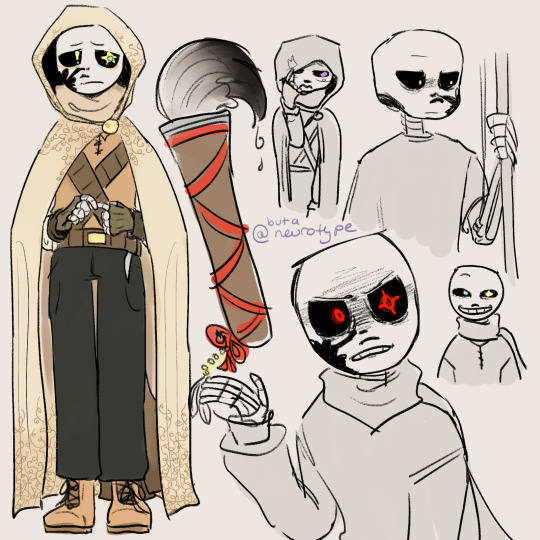
GUYS GUYS GUYS GOOO read ''Perseverance'' by @pastelaspirations !! ABSOLUTELY beautiful story that had me hooked since the start.
I am so obsessed with this fic and can only ever think about it everyday. At work or at home it is STUCK in my head.
If I hyperfixate on an AU of an AU it means it's GOOODD. READ IT !!!!
#I'm crying thank you so much#ALSO SCREAMING#I'M HAVING SO MANY PEOPLE RECOMMEND MY FIC TO STRANGERS NOW I DON'T KNOW WHAT TO DO#I'm also just. Holding my head in despair#You linked my blog and when you hover over it; you just#See shitpost after shitpost#Like w h a t#LIKE THE MENTAL DISCONNECT MAN#TELLING PEOPLE TO READ THIS AMAZING FIC THAT YA FOUND SO YOU LINK THE AUTHOR'S TUMBLR#AND IT'S JUST *FULL* OF LITERAL SHITPOSTS-#People just looking at it like “Are you serious; this is the actual author-”#Y e s. Unfortunately#L i s t e n#I know how to write intelligently and eloquently#I j u s t c a n ' t d o i t f o r m y b l o g#Or my author's notes tbh#O o o seeing your tag about working with students#That's so cool; man. I'm in a class rn teaching me how to teach languages to students#Thank youuu maaan. I relate to this Ink so much too tbh#A lot of it is because I project an unhealthy amount onto him#✧˖°.Can't feel alone if ya main writing inspiration suffers from literally everything you do✧˖°.#Except not. I deliberately didn't let Ink suffer from insomnia even though I absolutely do lmao#C r y i n g. Yes I know; his character development is literally off the walls insane#Y e s. This fic is my long; niche excuse to write an Errorink shipfic with all the mental trauma/psychological horror that I wanted#I have a very unhealthy attachment to Errorink okay-
102 notes
·
View notes
Note
What’s your opinion on the contrast between “silly” and “serious” spaces? Do you think people can have very serious interpretations about a genuine piece of media and also be goofy about it? I’m asking this particularly because I’ve seen people in the Magnus podcast fandoms fight about people “misinterpreting” characters you, Alex, and the many other authors have written. Are you okay with the blorbofication or do you really wish the media you’ve written would be “taken seriously” 100% of the time?
And follow up question, what do you think about the whole “it’s up to the reader (or in some cases, listener) to make their own conclusions and interpretations and that does not make them wrong”, versus the “it was written this way because the author intended it this way, and we should respect that” argument?
This is a question I've given a lot of thought over the years, to the point where I don't know how much I can respond without it becoming a literal essay. But I'll try.
My main principle for this stuff boils roughly down to: "The only incorrect way to respond to art is to try and police the responses of others." Art is an intensely subjective, personal thing, and I think a lot of online spaces that engage with media are somewhat antithetical to what is, to me, a key part of it, which is sitting alone with your response to a story, a character, a scene or an image and allowing yourself to explore it's effect on you. To feel your feelings and think about them in relation to the text.
Now, this is not to say that jokes and goofiness about a piece of art aren't fucking great. I love to watch The Thing and drink in the vibes or arctic desolation and paranoia, or think about the picture it paints of masculinity as a sublimely lonely thing where the most terrible threat is that of an imposed, alien intimacy. And that actually makes me laugh even more the jokey shitpost "Do you think the guys in The Thing ever explored each other's bodies? Yeah but watch out". Silly and serious don't have to be in opposition, and I often find the best jokes about a piece of media come from those who have really engaged with it.
And in terms of interpreting characters? Interpreting and responding to fictional characters is one of the key functions of stories. They're not real people, there is no objective truth to who they are or what they do or why they do it. They are artificial constructs and the life they are given is given by you, the reader/listener/viewer, etc. Your interpetation of them can't be wrong, because your interpretation of them is all that there is, they have no existence outside of that.
And obviously your interpretation will be different to other people's, because your brain, your life, your associations - the building blocks from which the voices you hear on a podcast become realised people in your mind - are entirely your own. Thus you cannot say anyone else's is wrong. You can say "That's not how it came across to me" or "I have a very different reading of that character", but that's it. I suppose if someone is fundamentally missing something (like saying "x character would never use violence" when x character strangles a man to death in chapter 4) you could say "I think that's a significant misreading of the text", but that's only to be reserved for if you have the evidence to back it up and are feeling really savage.
I think this is one of the things that saddens me a bit about some aspects of fandom culture - it has a tendency to police or standardise responses or interpretations, turning them from personal experiences to be explored into public takes to be argued over. It also has the occasional moralistic strain, and if there's one thing I wish I could carve in stone on every fan space it's that Your Responses to a Piece of Art Carry No Intrinsic Moral Weight.
As for authorial intention, that's a simpler one: who gives a shit? Even the author doesn't know their own intentions half the time. There is intentionality there, of course, but often it's a chaotic and shifting mix of theme and story and character which rarely sticks in the mind in the exact form it had during writing. If you ask me what my intention was in a scene from five years ago, I'll give you an answer, but it will be my own current interpretation of a half-remembered thing, altered and warped by my own changing relationship to the work and five years of consideration and change within myself. Or I might not remember at all and just have a guess. And I'm a best case scenario because I'm still alive. Thinking about a writers possible or stated intentions is interesting and can often lead to some compelling discussion or examination, but to try and hold it up as any sort of "truth" is, to my mind, deeply misguided.
Authorial statements can provide interesting context to a work, or suggest possible readings, but they have no actual transformative effect on the text. If an author says of a book that they always imagined y character being black, despite it never being mentioned in the text, that's interesting - what happens if we read that character as black? How does it change our responses to the that character actions and position? How does it affect the wider themes and story? It doesn't, however, actually make y character black because in the text itself their race remains nonspecific. The author lost the ability to make that change the moment it was published. It's not solely theirs anymore.
So yeah, that was a fuckin essay. In conclusion, serious and silly are both good, but serious does not mean yelling at other people about "misinterpretations", it means sitting with your personal explorations of a piece of art. All interpretations are valid unless they've legitimately missed a major part of the text (and even then they're still valid interpretations of whatever incomplete or odd version of the text exists inside that person's brain). Authorial intent is interesting to think about but ultimately unknowable, untrustworthy and certainly not a source of truth. Phew.
Oh, and blorbofication is fine, though it does to my mind sometimes pair with a certain shallowness to one's exploration of the work in question.
#Big thoughts#Big rambles#These are my current thoughts at least#They will likely change#As all things do
2K notes
·
View notes
Text
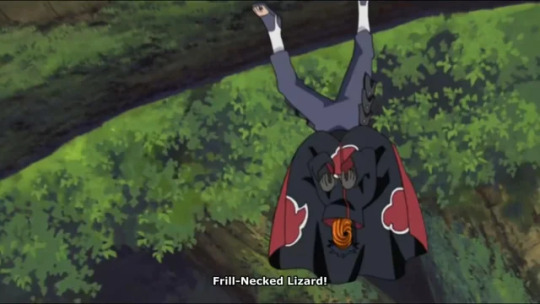
still thinking about Obito's tendencies to hang upside down so why not talk about something even more funny
now Obito is obviously trolling the Konoha squad in that moment, acting like a complete idiot and weirdo and all, usual stuff for Tobi. Obito is being a weird little bat on purpose, it's all an act
you know who among Akatsuki, a very scary and a totally serious organization, also acted like a weird little bat, but without it all being an act?
allow me to introduce you to the final page of chapter 238
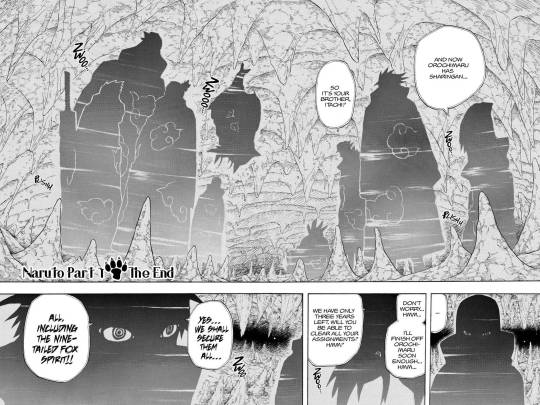
Kishimoto, why is Deidara's first appearance is him being upside down during Akatsuki's zoom meeting?
(which is supposedly the first one in 7 years since Orochimaru ditched them, but whatever, no fucking way these guys can remain semi-organized without a good old online meetup, I do not care for canon's opinion when it conflicts with my funny headcanons)
But seriously, it's been almost 10 years since I read the manga for the first time and there's still no explanation as to why Deidara did that LMAO. Logic dictates that it's simply Kishimoto not finishing up the designs for his new villains (rinnegan's design wasn't finalized until, like, Akatsuki Supression arc, I believe? there's someone TOWERING over Kisame who is 195cm already and at the end of the day remains Akatsuki's tallest member, etc etc), but I've got a PhD in overthinking Naruto details and turning them into shitposts that sometimes also turn into fanfiction, so I will take this one tiny detail and make myself laugh until I cry.
To me this moment is just so precious because it's actually a scene from OG Naruto, meaning that it's pre-timeskip, so Deidara here is only 16. And this just proves to me that Deidara's puberty (there is no exact indicator as to when Deidara was abducted recruited into Akatsuki, but I assume it happened sometime when he was 12, because during his recruitment we see Itachi (and we know that he joined Akatsuki after the massacre, so he was 13 and he's got a 2 year difference with Deidara), Kisame (who, judging by his pre-death flashbacks, joined AFTER Itachi, meaning some time had to have passed since the massacre) and Sasori (who wouldn't have a partner after Itachi joined because Orochimaru just couldn't resist trying to get that Sharingussy, but Akatsuki don't operate on their own in general, so I doubt Sasori would have been left without a partner for a long time, a year max) and during this zoom meeting 16-year-old Deidara speaks like he's very much aligned with Akatsuki's goals and grudges which would be very weird if he joined them against his will just recently, so a year or more would have to pass between Deidara's recruitment and the OG Naruto zoom meeting) was arguably one of the worst things that organization as a whole had to go through because teenage Deidara was JUST BUILT DIFFERENT.
Don't mind the fact that even as an adult he starts tweaking if he doesn't get to explode something every few hours (I would imagine that teenage rage and angst would only exacerbate this issue), but he would also just want to "look cool" and wouldn't listen to anyone in any position of authority AT ALL. Going back to this scene of Akatsuki's zoom call, we can see (and for certain characters assume because once again designs here are kind of wack) that these overly serious members like Pain, Konan, Kakuzu and Sasori are PRESENT and just... don't do anything about Deidara's antics? They just gave up at some point LMAO. And a while ago, I presume.
16-year-old Deidara, proud and puffed up as a lion: You can stay on the ground as boring old men you are, but I'm going to hang upside down today, hm!
Pain, the acting leader of this very serious and lethal organization that for some reason took in a 13-year-old and a 12-year-old because, I dunno, the real leader thought it would be funny, sighing: okay, Deidara...
I also don't believe that it was ever specified how Nagato's zoom jutsu works, but I think Akatsuki's members simply sit in whatever position they want and their projection is different from their actual position which means that. yeah. Deidara does a bat cosplay. because he wants to. baby why are you like that.
but I also like to imagine Deidara actually hanging on the ceiling during the meetup and the gang just going
Pain: Sasori, can't you grab a mop or something and swat him off of there?
Sasori, in the most dead inside voice imaginable: you are not paying me enough to do that. in fact, you would not last a minute in the asylum I'm living in. you can't give me 40 minutes of peace, can you?
honestly props to Onoki for finding a way to both continue using Deidara's skills for his goals (by just fucking paying Akatsuki and calling it a day) and keep the village intact, teenage Deidara just seems like the trial version of what Akatsuki members could expect on their missions. like, if you can't manage the stress of dealing with the (pony)tailed beast, you have no business trying to fight an actual tailed beast.
I'm also thinking that adult Deidara aka Shippuden Deidara would think himself really cringe for doing this shit when he was younger and feels kind of embarrassed in front of the other members (who unfortunately besides Hidan were there to witness his cringe bat phase of growing up in your local terrorist daycare organization), so he's pretty quiet during the zoom meetings when we get properly introduced to him.
That's, of course, until Deidara gets partnered with Tobi.
I can imagine the two of them competing who can last longer hanging upside down and now Pain really can't do anything to stop this bullshit because it's his actual boss and his clueless partner making their own bat nest during their zoom meeting. He just tiredly glances over at Konan who gives him a "I told you Yahiko was right and we shouldn't have joined forces with this guy, but when do you ever listen to me" look.
The gang would be discussing something like Kakuzu and Hidan brutally murdering Asuma (who's Obito's classmate btw and whose mother he already killed a while ago) and trying to steal his corpse to sell for some cash and in the background above them Tobi'll be yelling something like "senpai, watch what I can do" and start turning cartwheels on the ceiling.
tl;dr Obito and Deidara match each other's freak when it comes to doing weird shit for no apparent reason other than to fuck with everyone while on the job. thanks for coming to my TobiTalk
209 notes
·
View notes
Text
A lot of thoughts about Cripping Intersex
On 2024-09-29 we met to talk about Chapters 0 and 7-9 of the 2022 book Cripping Intersex by Celeste Orr. This was a book that numerous people had requested we read, and we wound up with deeply mixed feelings about it. 😬
Overall reactions:
Michelle: I found the concept of “hauntology” incredibly compelling. I’m here for some shitposting. 🍵
Apollo: I loved the concept of compulsory dyadism. I found the downplaying of “perisex” as a term to be weird, and the lack of divulging intersex/disability status was weird.
Elizabeth: the lack of diverging intersex/disability status wasn’t just weird, it was anathema to standpoint theory, and so every time Orr cited standpoint theorists, it made me seriously doubt Orr’s understanding of the theoretical basis that they actively chose to use 🧐. I was disappointed by this book. I agree with its central premise, so I should have been an easy sell. Instead I came out shaking, upset, feeling like Orr was a voyeur to our community, that Orr does not actually view intersex studies as a serious research area, that we’re just a theoretical fascination.
Remy: There were a lot of good points about how disability is socially constructed, but how Orr used “bodymind” detracted from their arguments for me. This book had a lot of uncomfortable conversations, some of them I was happy to read, some I need to come to terms with myself, while others I felt were treated a little too artificially equally such as the section with the phrase "the future is female" and the intersex community being involved in the queer community. 🤔
Bnuuy: it's really jarring how they approach the topic. There are a lot of pieces for a good theory here, but it’s kinda like Orr is just like the completely wrong person to go try to assemble them 🫤
As a collective, we generally were receptive (if not enthused!) about the central message that intersex benefits from disability studies/rights/justice perspectives, and that our community would benefit from more interaction with the disability studies/rights/justice communities! 💜
At the same time, we all agreed that Orr felt like a voyeur to our community. Rather than engaging with the intersex community, they seem to have a one-sided relationship where they read a bunch of things by intersex people but never actually conversed with intersex people. Whether Orr is intersex or not matters a whole lot less to us than whether Orr is actively participating in the community.
We made a lot of (unflattering) comparisons of Orr’s book to Envisioning African Intersex by Swarr, an intersex studies book by a perisex author. The latter is a great example of how a perisex scholar can do right by the intersex community: Swarr is clear about being perisex, clearly lays out her motivation for writing the book (she saw medical photography of intersex people, thought it was fucked up, later became friends with intersex activist Sally Gross, and then wanted to honour Gross’ memory after Gross died tragically.) Swarr was clearly connected to multiple African intersex organizations and made an explicit, deliberate choice to publish her book as open access so that the work could actually be read by the African activists she has been working with. Swarr’s perisex status matters a lot less than the fact that Swarr writes in a way that demonstrates personal investment in advancing intersex rights/justice.
Orr may or may nor be intersex. We don’t know. We don’t really care, because Orr doesn’t demonstrate personal investment in the intersex rights/justice/studies communities. That’s what actually matters to us, and it's what a lot of this post is going to talk about.
Underneath the cut we're going to go into a lot more detail about the book. There were things we liked about the book, and want to be fair in our assessment. Some of the complaints we had about the book hinge on an understanding of sociological theory and academic practices, so we'll give some context on those issues.
What we liked
This book had a bunch of things going for it.
The one thing this book did better than Swarr was its use of hauntology. Swarr invokes hauntology in her book, but not nearly as effectively as Orr does. Orr gets a lot of effective mileage out of how the spectre of intersex haunts people’s bodies. Not just intersex people’s bodies, but also the bodies of pregnant people who are called upon to exorcise the spectre of intersex through selective abortion should a foetus be identified as possibly intersex.
The haunting metaphor rung true for talking about how we intersex people are haunted by past surgeries, forced treatments, medical trauma, and so on. Even when we’re “done” with receiving gender-altering “treatments” we live with their ghosts every day.
We liked the explicit connections that Orr drew between intersex and disability studies. Elizabeth in particular was warmed by the shoutout to how Garland-Thompson explicitly includes intersex in her disability studies work. We felt that Orr perhaps underestimates how receptive many intersex people would be to their central argument - Orr takes on a tone of “hey bear with my crazy radical argument” that we weren’t sure was really necessary.
Orr is not the first to make the argument that intersex organizing and scholarship would benefit from more alignment with the disability world. This gets into criticisms, but Orr isn’t the first to make this argument yet seems unaware of how regularly the argument comes up. Indeed there’s a whole chapter in Critical Intersex (2009) arguing that intersex is better off allying with the disability community than the queer community. It’s not hard to find intersex people on this very website arguing similar things. Intersex-support even has a whole section on it in their FAQ, though it does cite Orr (lol). Orr does at least seem aware of Koyama’s work making this argument.
We appreciated Orr calling out ableism in a lot of intersex organizing. When intersex people and organizations insist that intersex is NOT a disorder or disability, they conflate disorder and disability. This is an ableist conflation: disability activism tends to start from a place of resistance to the medical model of disability, whether it be by the social model or more recent ones like the political/relational model.
Intersex activists insisting that intersex is “NOT a disability” reinforce the idea that disability is a negative, tragic thing. It’s the “I’m not like the other girls” rhetoric: putting down people who experience the same oppression you do in an effort to gain some credibility. It holds our movement back, because ableism is a very potent part of how we intersex people are oppressed. Orr does an effective job of laying this out, and we recommend reading the first chapter for this.
Orr coins a term, temporarily endosex, to talk about how people can learn at any age or time that they have had intersex traits all along. (Another way in which intersex can haunt!). For Elizabeth, the idea of temporarily perisex helped zer understand why perisex people can be *so* insistent in defining intersex as something visible at birth: because if intersex is something you can become at any age, this threatens perisex people with the possibility that they too could find themselves on the minority side of the tracks.
Other terms that Orr uses were big hits with the group. Elizabeth loved “curative violence” and ze expects to get future mileage out of the term. Ze also liked the framing of IGM as medical malpractice. Apollo praised “compulsory dyadism” as a concept. Remy shared that the cyborg stuff in the book gave them a lot to think about.
The book features a takedown of eugenicist rhetoric by a bioethicist by the name of Sparrow. We all agreed that Sparrow’s arguments sucked, were grossly eugenicist, and welcomed that Orr had put in the work to rebut his hateful messaging. Michelle praised how they invoked Sparrow’s lists of undesirables that Preimplantation Genetic Diagnosis is supposed to prevent: for xem, it evoked monstrosity identification theory and ideas of the abject.
Elizabeth liked Orr’s argument that genital differences are a threat to the heterosexual (perisex) imagination: there’s so much porn out there that incorrectly presents intersex as “typical fully-developed penis plus typical fully-developed vagina” that really reflects how perisex people have a serious lack of imagination about genitals.
Fact Checking
There are a number of things that Orr says that we felt warrant an explicit fact check.
Orr presents the terms “perisex” and “endosex” as though they are contentious within the intersex community. They are not. The general consensus that one’s choice of perisex/endosex/dyadic is a question of personal preference and familiarity.
Orr clearly prefers the term dyadic, and makes a show of casting aspersions on “perisex” and “endosex”. They make it seem like their origins are disputed, and selectively cite Tumblr posts to make this argument. “Perisex” is actually the most common antonym to intersex on this very website, so it feels surreal that they're publishing the rare anti-“perisex” posts on this platform. Orr does correctly cite the Tumblr which coined “perisex”, the issue is they try to discredit it as a means to make it seem like this is not a term embraced by the intersex community.
Orr makes it seem like the origin of “endosex” is a suspicious mystery. It’s not. the term was first used in German in 2000 by Heike Bödeker. Bödeker is controversial for supporting autogynephilia 😬, but we've never seen anybody doubt Bödeker having mixed gonadal dysgenesis.
Orr clearly prefers the term “dyadic” and makes zero attempt to source the term, and the most minimal attempt at covering its controversy. This term actually does come from outside the intersex community! The term came from gender studies, popularized by 1970s radfem Shulamith Firestone. And it’s controversial for more than just being a laundering of “sex binary”.
Nobody calls it “ipso gender” anymore. It was coined as “ipso gender” but in actual usage has been “ipsogender” from basically as soon as the term was coined.
Orr uncritically repeats a quote which romanticizes home births in Black & Indigenous communities as that intersex-at-birth babies were accepted and cared for in a way that wouldn’t happen if the baby were born in hospital. This, sadly, is deserves scrutiny. We’re not saying it never happened: one can find stories supporting it. But the historical and sociological evidence show that infanticide of intersex infants has been widespread globally, and this includes traditional Black and Indigenous birth attendants. Collison (2018) as quoted in Swarr, reports that 88 of 90 traditional South African birth attendants they interviewed admitted to “getting rid” of a child if it was born intersex. That very story we just linked to about a Kenyan midwife saving intersex babies made the news because infanticide was the norm. In North America, some First Nations had similar traditions, e.g. the Navajo would leave intersex babies to die in arroyos, and the Halq’eméylem would leave them to die on a specific mountain. 😢
Michelle was visibly upset when talking about Orr’s repeated comments which insinuate that LGBT marriage equality was an attempt to fit in + liberalism + conformity. In Michelle’s words: “AIDS activists did not watch their lovers die for you to say that marriage equality is conformist bullshit. As a [polyamorous] person who is not legally married to xer spouses, I really felt that one, and I was intensely angry about how Orr was dismissing those activist efforts and the importance of them.”
The Voyeuristic Vibes
The consensus in the group was that Orr’s writing came off as voyeuristic of the intersex community. There were several points in the book where Orr seemed strangely disconnected from the intersex community. Sometimes it was small things, like spelling ipsogender as “ipso gender”, or favouring the term “interphobia” when “intersexism” is actually more popular in the community (it also avoids the potential casual ableism of framing bigots as clinically insane! Which you’d think a crip theorist would be sensitive to…. 👀)
Other times, it felt like a deeper, conceptual thing. For example, Orr’s top priority in future work was to apply their interpretation of intersex issues to critique how LGBT marriage equality was a homonormative, neoliberal, conformist movement. Not only was this viscerally upsetting to Michelle, for Elizabeth it was galling that this is what Orr seems to think intersex perspectives are good for: pushing down other queer groups. 😬 It added to the sense that Orr saw us as a nifty theoretical lens, and wasn’t particularly interested in advancing the intersex cause.
Another disconnection that was noted was in how Orr rebutted Sparrow’s claims that genital differences are disgusting and will not elicit sexual desire in others. Despite detailed rebuttals to other appalling comments from Sparrow, Orr does not bring up the intense fetishization of intersex genital differences which is uncomfortably familiar to all of us. Objectifying medical photography of intersex people with genital differences are shared widely and known to be used for sexual purposes.
Bnuuy was annoyed that Orr seemingly didn't try to talk to or otherwise get input/feedback from any disabled intersex people for their thesis, given that disabled intersex people are not actually that hard to find! (Indeed, four out of five of us are both intersex and disabled.) Given Orr’s emphasis on intersectionality, it’s notable that when they sought intersex texts to analyse, they focused on texts from nondisabled intersex folks.
Orr does not reveal if they are intersex nor if they are disabled. It sticks out. Whether they’re actually intersex or not isn't actually that important to us. We’ve previously read intersex studies works by perisex authors which we loved, and we believe strongly that it is possible for perisex authors to do right by the community if they take the time to engage WITH the community. (See Swarr as an exemplar!)
What we had major problem with is the faux “objective” tone that the book takes on. Orr seems to be trying to hide behind academic language, the “view from nowhere”, and an expensive paywall. This was noticeable to everybody. But Elizabeth, as the only academic in the call, came in with a lot more context as to why it felt gross.
The Misuse of Standpoint Theory
For Elizabeth, Orr's “view from nowhere” became egregious when Orr cites standpoint theorists like Donna Haraway, Nancy Hartstock, and Pat Hill Collins. In a surreal move, Orr explicitly points to Haraway’s famous paper “Situated Knowledges: The Science Question in Feminism and the Privilege of Partial Perspective”. This paper is an evisceration of the “view from nowhere”, “objective” approach to academic knowledge production. Every view is a view from somewhere, and pretending otherwise feeds into the history of how science has been violently used to gaslight and oppress minority groups.
In short, Haraway says:

Elizabeth explains that as result, feminist methodologies accept subjectivity as part of the process: the researcher is expected to articulate their own standpoint, to be transparent about their subjectivity rather than to hide it behind a pretense of “objectivity”. There’s an emphasis on reflexivity, the fancy word for when scholars reflect on how their own social position affects how they do their research.
Feminist disability studies and crip theory both build on feminist standpoint theory, and Orr claims to be using both. Both frameworks understand disability as socially constructed, and that this social construction is entwined with other social forces such as capitalism, sexism, racism, and so on. Feminist disability studies scholars like Wendell (who Orr cites) clearly position themselves and how their disability (or lack thereof) affects their research.
Crip theory builds further on feminist disability studies, and acts to subvert ideas of ability. It began in the arts - cripping performance art by having wheelchair users perform as dancers, blind people doing photography, Deaf people making music, etc. It spread into other domains, such as crip technoscience. Crip theorists also inherit the tradition of reflexivity, whether it be Eli Claire writing about their personal experiences of disability or Sami Schalk talking about how being nondisabled affects her work as a disability studies scholar.
We provide all this exposition to emphasize how unusual it is that Orr provides absolutely zero information about their positionality nor their personal motivations to this research. 🧐 They provide zero reflexivity as to how their position may have affected their work. Yet their personal biases and subjectivity seemed obvious to us - we were all, in varying ways, set off by Orr trying to pass off subjective opinion as “correct”. As an example, we mentioned how Orr clearly prefers the term “dyadic” and manufactures controversy about the origins of “endosex” and “perisex”, while at the same time conveniently leaving out the unsavoury origins of the term “dyadic”.
Elizabeth pointed out that the ironic thing is Orr didn’t even need to invoke standpoint theory to make the argument that intersex studies would benefit from a disability studies lens. Plenty of intersex and disability studies is done using different frameworks.
Indeed, Elizabeth was surprised that this kind of error made it through a PhD thesis defense. In the department where ze teaches, if a student displays a major misunderstanding about their chosen theoretical framework, the student would be asked to redo the relevant thesis checkpoints (e.g. candidacy paper, thesis proposal/defense) until they get it right.
Some background on academia
Elizabeth brought up a structural problem with the book: it looks like it had zero intersex studies scholars review it prior to publication. 💀
This book originated as a PhD dissertation, which anybody can read for free here. A typical PhD programme is structured as a master-apprentice model of education, where a PhD student apprentices to one (sometimes two) professors. These are known as thesis advisors. The culmination of the PhD is a thesis (aka dissertation), which presents original research done by the student.
To graduate, the thesis needs to pass examination by a committee of professors. The committee acts as a secondary source of support to the student, providing guidance or perspectives to complement the advisors.
Elizabeth explained that when ze assembles a thesis committee for one of zer graduate students, the goal is to ensure any area that the student is venturing into has at least one committee member who is well versed in it. So, let’s say you propose you’re going to do a thesis on “intersex studies meets disability studies” but your thesis advisors are both gender studies people (as Orr’s were). Elizabeth would expect that Orr’s thesis committee would then include at least one disability studies scholar and at least one intersex studies scholar.
Instead, Orr’s thesis committee doesn’t have a single intersex studies scholar on it. Neither the book’s acknowledgements nor the thesis’ acknowledgments acknowledge any intersex studies scholars. Even though Orr is citing intersex studies scholars like Georgiann Davis, Morgan Holmes, and Cary Gabriel Costello, there's nothing to indicate that Orr has ever gotten feedback from any intersex people. This is HIGHLY unusual: normally, intersex studies books have acknowledgments which acknowledge several publicly intersex people, and often one or two intersex organizations.
Research is a highly social activity: researchers are expected to go to conferences, to be in conversation with people working on similar topics. And Orr is clearly social about their research, acknowledging the feminist/gender studies communities they have been a part of. It just seems like intersex studies scholars weren’t a priority for Orr’s academic socializing. 🙃
Orr’s acknowledgments doesn’t even contain the word intersex, which is unprecedented in our collective experience of intersex non-fiction. This is why Elizabeth says that ze was left with the impression that Orr doesn’t think intersex studies is a serious field of research. It appears that Orr views intersex literature as something to be consumed for their benefit, and not a community worthy of participation and a bi-directional relationship.
Early in the book, Orr points to Lennard Davis’ work with the Deaf community on reframing Deaf activism away from the “we’re not disabled we’re a linguistic minority” rhetoric. It’s a great example of disability studies scholars having an impact. Thing is: Davis openly talks about how he grew up in a Deaf family that was part of the Deaf Community. While Davis is not little-d deaf, he took on the project as a member of the capital-D Deaf community. His writing (including book acknowledgments) reflect this.
Elizabeth also pointed out that there are scripts and precedent in academia for how to handle positionality and reflexivity when you’re questioning or closeted. If Orr were closeted or questioning, they would have an excellent way to talk discreetly about it through their very own concept of “temporarily endosex”: Orr could write they don’t know they’re not perisex, frame it around how few perisex people actually know they’re perisex, and retain plausible deniability.
Other notes
Bnuuy was frustrated with the implication that disability studies is The Only Right Way to analyse intersex. It’s a useful lens for understanding intersex, but at times it felt like Orr was arguing it was the only appropriate lens rather than one of a collection of suitable lenses. Theories are analytic tools, and social phenomena are complex and fluid - it’s a matter of finding a suitable tool for a given research question, rather than there being One Correct Way to understand things.
Orr’s use of “bodymind” didn’t quite land. The term was created by Margaret Price to subvert the idea that body and mind are dichotomous: many disabilities cannot neatly fit into “mental” vs “physical”. It’s a term that’s had productive use in disability studies. But Orr’s use of it got a negative reaction. Remy pointed out it felt like it instead it actually reinforced the body-mind distinction. Intersex is, after all, a physical thing, and the idea of “brain intersex” is very poorly received by the intersex community - it’s seen as a way that perisex trans people appropriate intersex and/or live in denial about being perisex. It felt like Orr was using the word on autopilot rather than thinking about when and where it is actually subversive.
Bnuuy was concerned that Orr was reading OII Australia’s information on intersex in bad faith. Orr criticizes them for discursively distancing intersex from disability. Bnuuy points out that OII Australia is not writing for an academic (disability studies) scholarship. This is an advocacy organization speaking to a general audience that understands disability through the medical model. Bnuuy read the quotes from OII Australia as them just distancing themselves from a medicalized understanding of disability.
Elizabeth brought up that Orr’s manufactured controversy of “perisex” may have a classist element. While endo- does make sense as an antonym to inter- if one has formal science background, the term peri- is not conventionally an antonym to inter-. Elizabeth has personally noticed a resistance from zer fellow academics to perisex on the grounds that it’s “using scientific terminology incorrectly”, and thinks that’s a classist take.
Michelle brought up that “it also didn't sit great with me that they [Orr] were very condescending about Tumblr like, ‘aww, look at the baby activists trying to do a scholarship," whereas what I'd describe as ‘folk scholarship’ on Tumblr has been very valuable to me. It's not always correct and there can be misinformation, but it has worth.” Remy was unimpressed with how limited/selective Orr’s engagement seemed to be with intersex Tumblr, as well as Orr’s centrist take on “the future is female”.
Closing thoughts
This was a deeply imperfect piece of scholarship. Orr came across as disconnected from the intersex community, and uninterested in working with the community. The work still has some merits: Orr’s first chapter provides an incisive discussion of how ableism is detrimental to intersex advocacy and that trying to distance intersex from disability only adds to societal ableism. Ableism is a serious force in intersex discrimination and we’re stronger off understanding this and explicitly resisting it.
We hope that the stink of Orr’s voyeurism does not sully the important central message of their book. Work needs to be done to teach more intersex people about disability studies. Disability does not mean disorder. Disability does NOT mean medical problem. The disability rights and justice movements are FULL of disabled groups who, just like the intersex community, are actively seeking de-pathologization, bodily autonomy, patient-led care by respectful and well-informed physicians, and fighting neo-eugenics. We are in good company with groups like the Deaf, neurodiversity, and little people communities.
#oh also reminder: we're meeting on Friday to talk about Wicked!#intersex book club#intersex books#intersex#actually intersex#intersex studies#queer theory#crip theory#standpoint theory#disability studies#academia#crip#book reviews#book review#book summaries
69 notes
·
View notes
Note
also reblogging here for the phrase "psychic Sayori jumpscare" lmao
Psychic Sayori jumpscare what the fuck
>tfw I've been slowly and subtly hinting at it for a few months and then it only finally came to a head last month when I said it in passing on accident to my girlfriend, so we finally went through with it
Absolutely all for the came back, but came back different trope. So, as far as I and @brownhairedbookworm are concerned, that's what happened! Monika worked so hard to bring her friends back after her mistake and didn't sleep or rest well for two whole weeks to do so. She finally had her breakthrough, but they have all been forever changed since the incident, whether it was meant to be that way or not.
10 notes
·
View notes
Text
So apparently! DDLC is doing a cafe collab! (I did not expect the cafe in question to be in California actually-)
Anyway here's the menu

Why do I care, since I'll never be able to have any of this?

BECAUSE IF ANYTHING IS "BAPPLES, CINNAMONED" IT'S THIS FUCKING THING.
7 notes
·
View notes
Note
I love that we all get lost in the sauce of your blog content and never see your blog header that DOES list your ao3.
to every anon that has asked previously: I am not judging. I am in the emotional whiplash boat with you and would also forget the ao3 if I didn't have notifs on for every time Res posts
Haha I totally understand why people would miss it, but it is there in case anyone ever forgets! I think there’s also a genuine mental reluctance to associate “horny shitposter” with “ao3 author who writes occasionally serious things” too. Because sometimes I’ll be posting angst on ao3 at the same time I’m talking about bending Alfred over a desk on here and the juxtaposition is a lot even for me 🤣
Plus, every now and then when I reply to an ask about my ao3 username I get a panicked anon or two saying “YOU’RE TheResurrectionist?” which amuses me to no end. Peak identity porn/reveal, truly.
48 notes
·
View notes
Text
Re: Couch fucking
Since people saw “JD Vance fucked a couch” mentioned in the “Tampon Tim: He’ll stop the red wave” post and went “What? JD Vance fucked a couch?,” no, he did not fuck a couch in his youth. The rumor was started by a random shitpost on the service I will continue to call Twitter until the heat death of the universe:
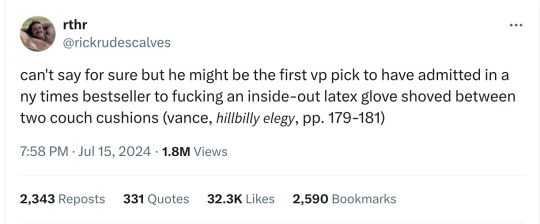
(Archived by Snopes, now view-limited by the author)
@rickrudescalves
can't say for sure but he might be the first vp pick to have admitted in a ny times bestseller to fucking an inside-out latex glove shoved between two couch cushions (vance, hillbilly elegy, pp. 179-181)
7:58 PM • Jul 15, 2024 • 1.8M Views
No draft or edition of Vance’s book Hillbilly Elegy ever said any such thing, but the inclusion of page numbers made “JD Vance fucked a couch” look very truthy (file this away as a tactic to look for in other propaganda you see). Neither Vance nor the Trump campaign can fully deny this because that would only draw more attention to the concept of “Vice presidential candidate JD Vance fucked a couch.” In great frustration, a campaign spokesman has finally said,
"We're not going to talk about couches or coconuts or whatever weird fetish KamalaHQ is into. When we have something to say, we'll say loud and clear. If Kamala is a coward, we'll call her a coward. If Tim Walz is a liar, we'll call him a liar.”
JD Vance then proceeded to lie about Tim Walz’s 24-year military record, calling it “stolen valor.”
As much as people enjoyed Walz’s quip that he would love to debate Vance if Vance would be “willing to get off the couch,” I do agree that Democrats should not stoop to such Republican tactics as (off the top of my head)
Telling lies about presidential candidate John Kerry’s military service (which inspired the general term “swiftboating” “to describe an unfair or untrue political attack”)
Claiming that then-presidential candidate Barack Obama was born in Kenya and not an American citizen, which would disqualify him, leading to an entire “birther” movement headed by Donald Trump
Accusing Democrats of trafficking children in the basement of a pizza parlor that had no basement, leading one man who sincerely believed this to “[travel] to Comet Ping Pong to investigate the conspiracy and [fire] a rifle inside the restaurant to break the lock on a door to a storage room during his search”
Claiming that North American schools keep kitty litter on hand for students who “identify as cats,” a “joke” meant to target protections for transgender students
And, as mentioned, splitting hairs over exactly what rank Tim Walz had vs what he retired at, elevating this to a far more serious accusation of stolen valor. In fairness, this is probably revenge for the couch thing.
So yes, I agree, we shouldn’t use the same tactics that the Republicans have been using for decades. It’s tasteless and it does not make us look better. I would perhaps remind you of the saying “Live by the sword, die by the sword,” but yes, we should stop confusing people into thinking that JD Vance fucked a couch. No couch was ever fucked by JD Vance. I endorse this message.
#again: I value accurate criticism#is this post snarky and disingenuous? deservedly and I own that#us politics#jd vance did not fuck a couch#long post
108 notes
·
View notes
Text
Adam Tooze giving some pitch-perfect pornography targeted at me specifically with Israel's "Gaza 2035: A three-step master plan to build what they call the Gaza-Arish-Sderot Free Trade Zone", capped with an AI generated Gaza-Dubai:

I'm in love, this is so glorious. "The world if Israel could play around with Gaza like a little set of Legos" tell me this is not identical energy:

Except its not a shitpost its an actual report from the Office of the Prime Minister. And folks we have got it all! The most convoluted administration system you could possibly imagine for no reason:
The new free trade zone would be administered by Israel, Egypt, and what the Israeli Prime Minister calls the Gaza Rehabilitation Authority (GRA)—a proposed Palestinian-run agency that would oversee reconstruction in Gaza and “manage the Strip’s finances.”
A cutesy little minimalist graphic of all the brand new industries that will magically become globally competitive in export markets because Israel says so:

The beach resorts are in my beloved!! But what are the little factories you ask? Oh nothing, just electric car production facilities!

Remember, before building your first factory, you need 18 Burj Khalifas. We economists call this "infrastructure development", take notes.
It will have high-speed rail through its center, oil projects on the coast, and of course, I'm saving the best for last - a rail project to NEOM:

🥳The 🥳Line 🥳Mentioned 🥳
The legend on the map literally just says "a mega project" like, oh yeah, one of those! See em all the time.
Now, you might be asking - Ash, if this is your goal wouldn't you have not destroyed every square inch of habitable urban infrastructure in Gaza and shredded their economy into scraps of paper soaked in blood if your plan was to Singapore-on-the-Sea the place? You sweet summer child, those apartments? They are apartments of the past, darling, you don't need organically developed urban ecologies built over time to compliment human habitation. That is for fucking libs. All of this "war" thing was just set-up to create a blank slate for the construction of The Line 2: Its Definitely Real This Time!
I am going to murder James C Scott myself just so I can hover this plan over his corpse and watch the sheer hubris of this monument to the state's desire for legibility and technocratic solutionism resurrect him from the goddamn grave.
"Well....at least after all this they would have to recognize Palestine as a stat-" Woah woah woah woah, hold on:
The final stage would be when Palestine signs the Abraham Accords signaling “Palestinian self-rule,” albeit without statehood
Lets not...lets not get overambitious here. Baby steps, you know? We have to be careful.
Anyway this is the most ludicrously ill-considered and ill-presented reconstruction plan I have ever seen in my life and I shudder to think that, instead of it being an off-hand drip of propaganda intended solely to brush off nosey reporters and diplomats, it might actually be serious. Bibi hasn't let me down yet on the "thinking things through" front!
But tbc if this was fiction - instead of a ruthlessly grim reality - the Regional Deputy Minister of Trade charged with implementing this technocratic abortion would be my precious little blorbo and I would stan her to hell and back.
90 notes
·
View notes
Text
Hi, I’m Elliott, and writing smut changed my life.
I also write military sci-fi and fantasy and D&D shitposts, but this is about the smut. I promise it won’t get weird. Much.
In 2010, I was scraping by as a substitute teacher and things were not great at home. I had only written gamer fic for friends, my aspiring mil sci-fi novel was stuck, and I needed some sort of escape… and I thought, “Well, I like sexy stories, and Literotica is free, and…”
My story was a feel-good adventure about a college guy with a heart of gold, a jaded demon weary of evil, and Heaven's hottest mess. It was silly. It was sexy. It was polyamorous, warm, and irreverent, and Literotica loved it: high ranking, tons of comments, and holy shit am I getting positive feedback from the internet?
So it became my first book:
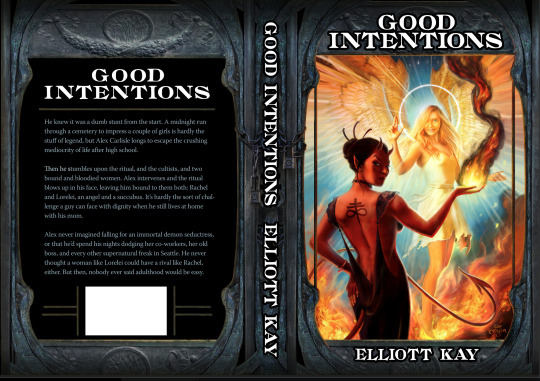
…and that book plugged some holes in my life. It didn’t get me out of subbing, but it filled the financial gap, and it picked me up after a break-up. More importantly, it gave me an audience. When I published Poor Man’s Fight, I already had readers, and that led to more readers… many of whom then picked up Good Intentions and loved that, too, though some had the shocking experience of “Oh my god, it’s full of butts!”
If you’ve read this far, it’s probably time for the content warning. I’m a big believer in these, for serious reasons and, um… less serious.
WARNING: “Good Intentions” contains violence, explicit sex, nudity, inappropriate use of church property, portrayals of beings divine and demonic bearing little or no resemblance to established religion or mythology, trespassing, bad language, sacrilege, blasphemy, attempted murder, arguable murder, divinely mandated murder, justifiable murder, filthy murder, sexual promiscuity, kidnapping, attempted rape (which is never comedy), immolation of said attempted rapists, persistent disrespect for vampires (which is always comedy), arson, dead animals, desecrated graves, gang activity, theft, assault and battery, panties, misuse of the 911 system, fantasy depictions of sorcery and witchcraft, multiple references to various matters of fandom, questionable interrogation tactics, cell phone abuse, reckless driving, even more explicit sexuality, illegal use of firearms within city limits, polyamory, abuse of authority, hit and run driving, destruction of private property, underage drinking, disturbances of the peace, disorderly conduct, internet harassment, bearers of false witness, mayhem, dismemberment, falsification of records, tax evasion, bad study habits, and an uncomfortably sexy mother.
…and that’s just the first book.
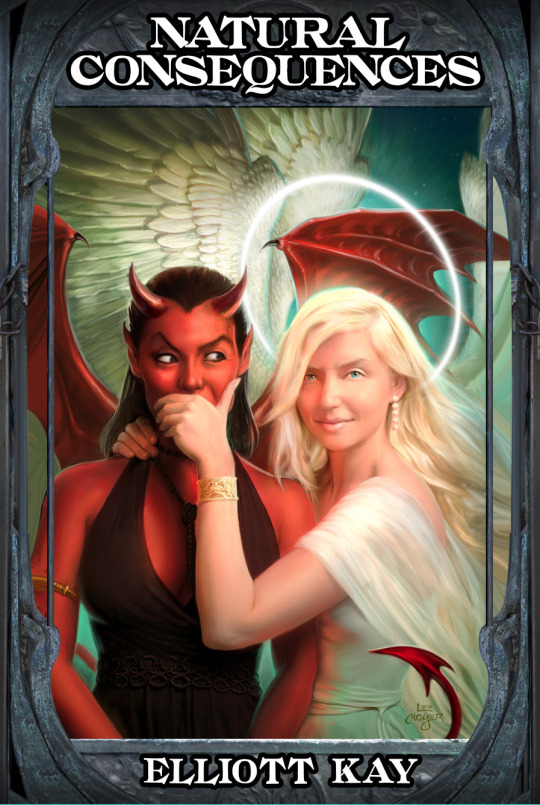
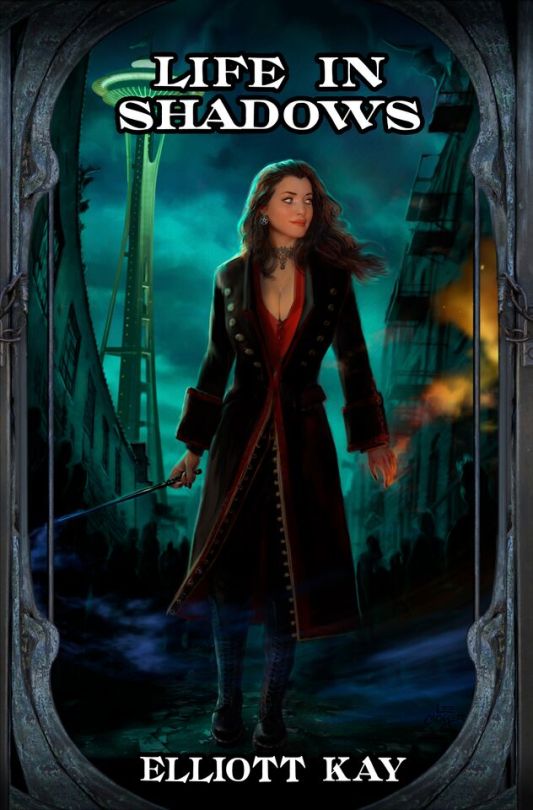
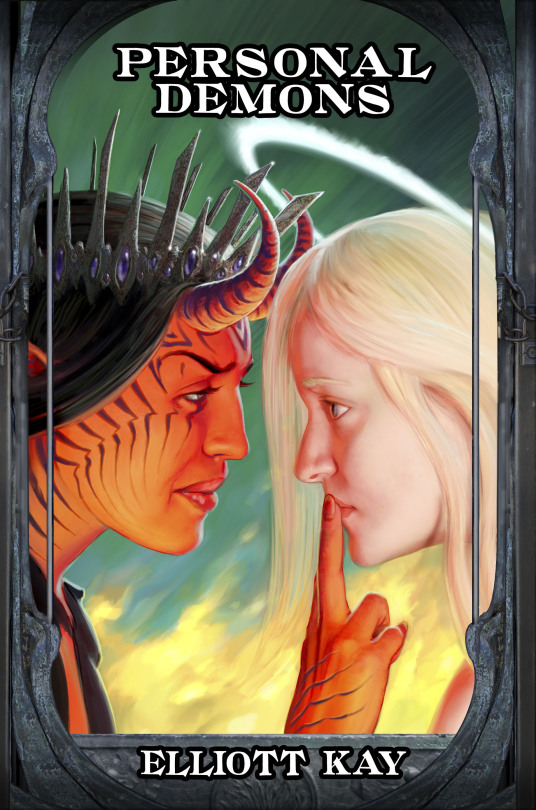

They've all got those warnings. Even the short story collections.
Credit to the incredible @leemoyer for all my book covers, and for teaching me so much about this biz. And while he's not on the book covers, I've gotta share the other central protagonist as illustrated by the awesome @juliedillon:
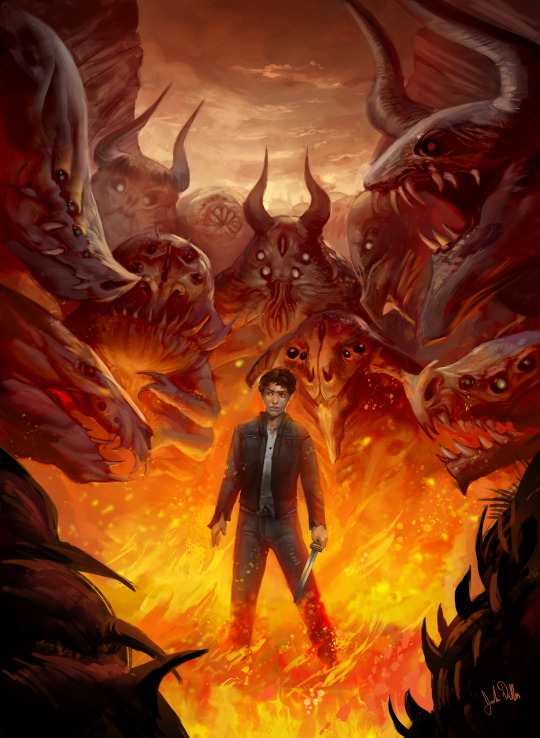
...yeah, Alex gets into some shit.
If you're looking for protagonists who really communicate, if you want polyamory instead of love triangles, and if you hate when steamy scenes fade to black, I've got you covered.
If you’ve read this far and you’re interested, or even if you just want to see more content warnings, please give my stuff a look on Amazon (including Kindle Unlimited) or on Audible where they’re narrated by Tess Irondale. Give her a listen and you’d be happy to hear her read just about anything.
433 notes
·
View notes